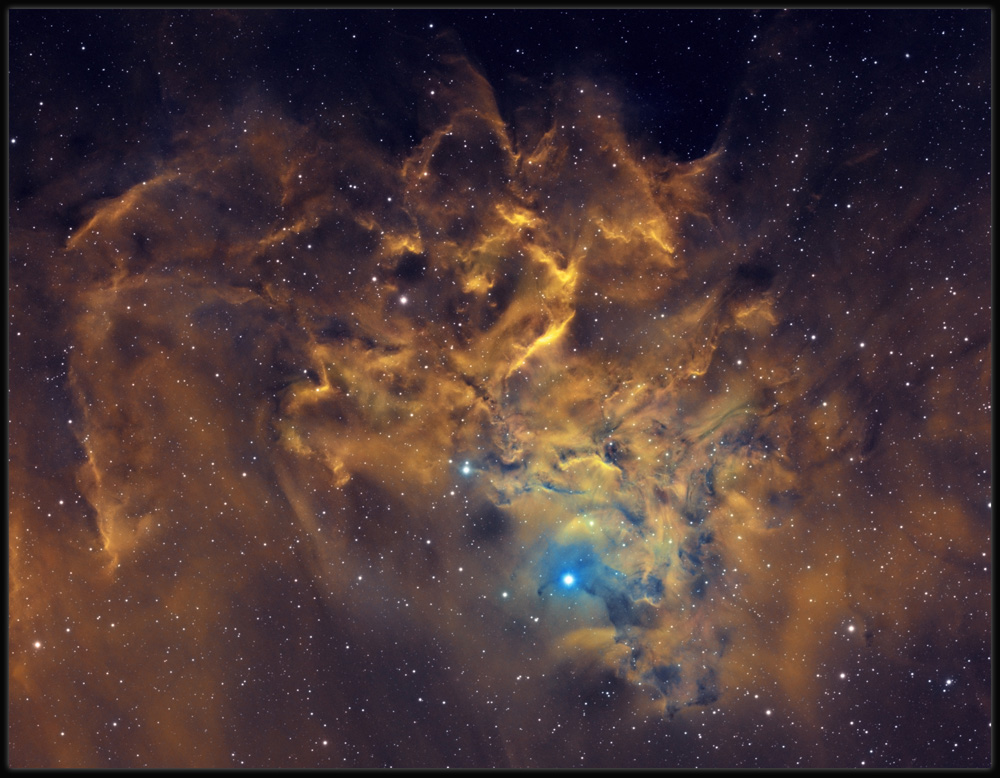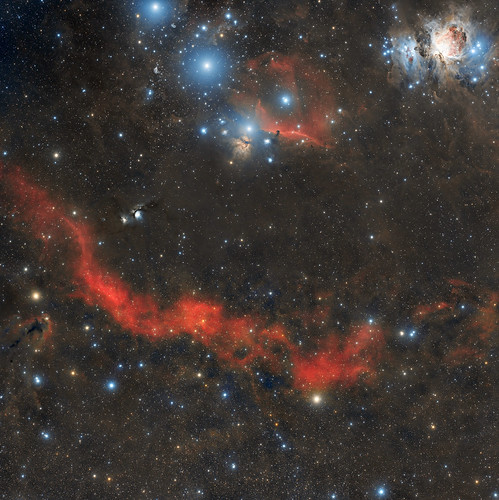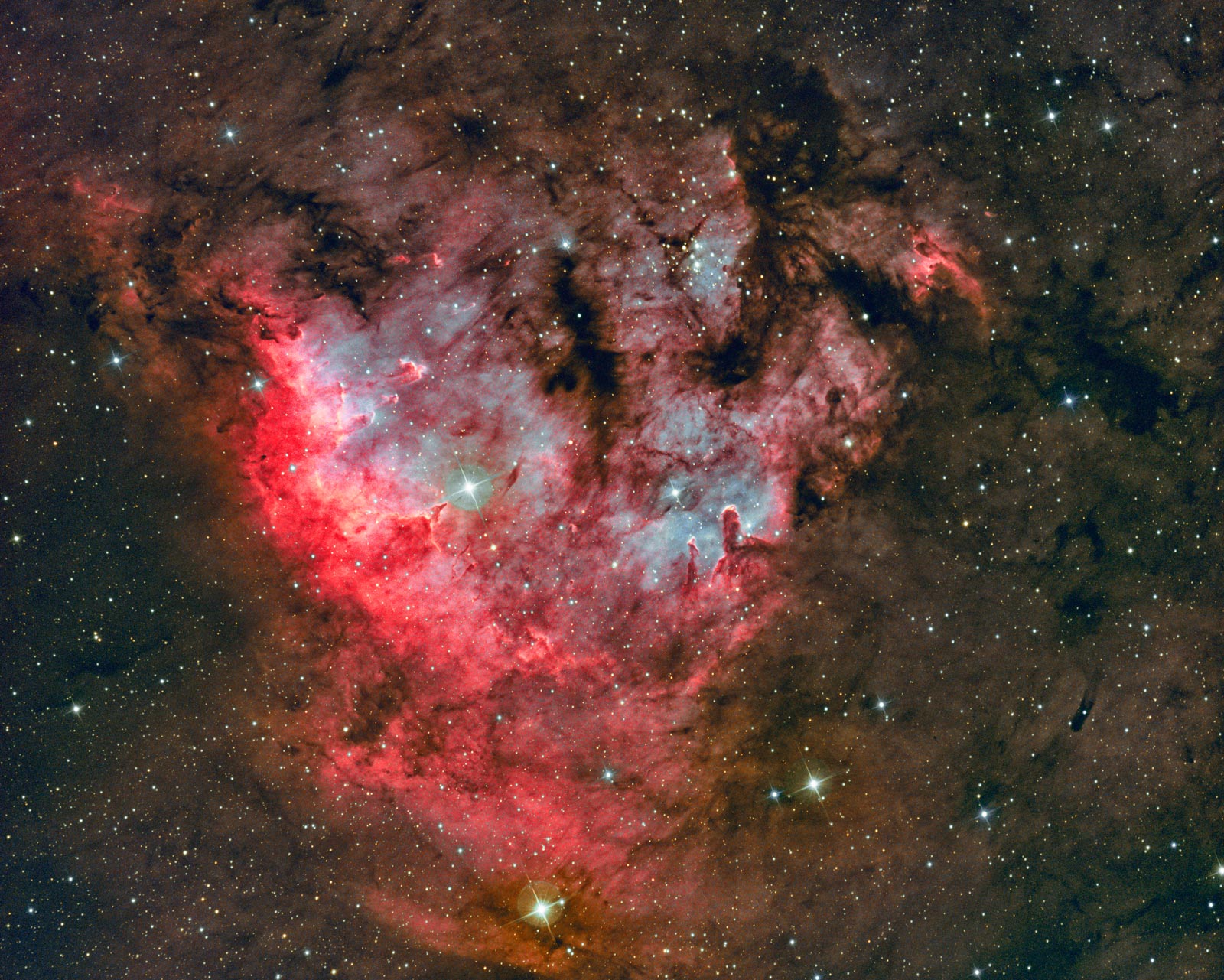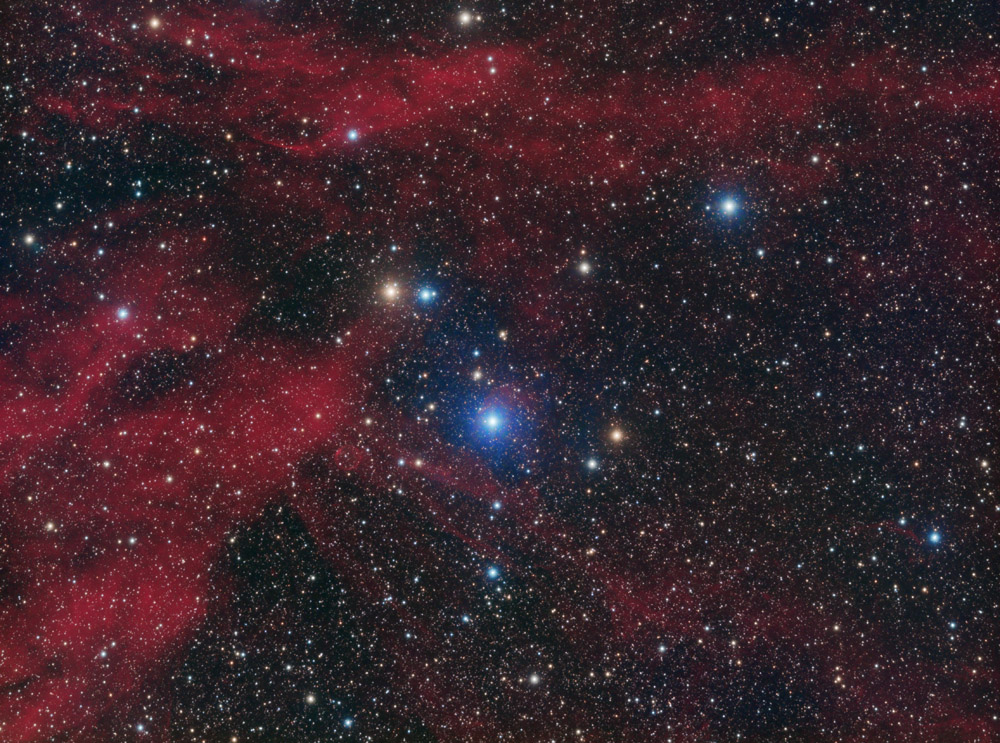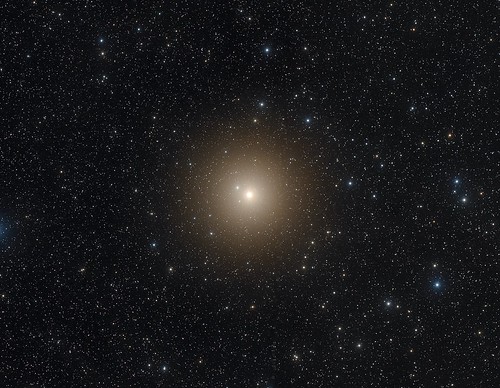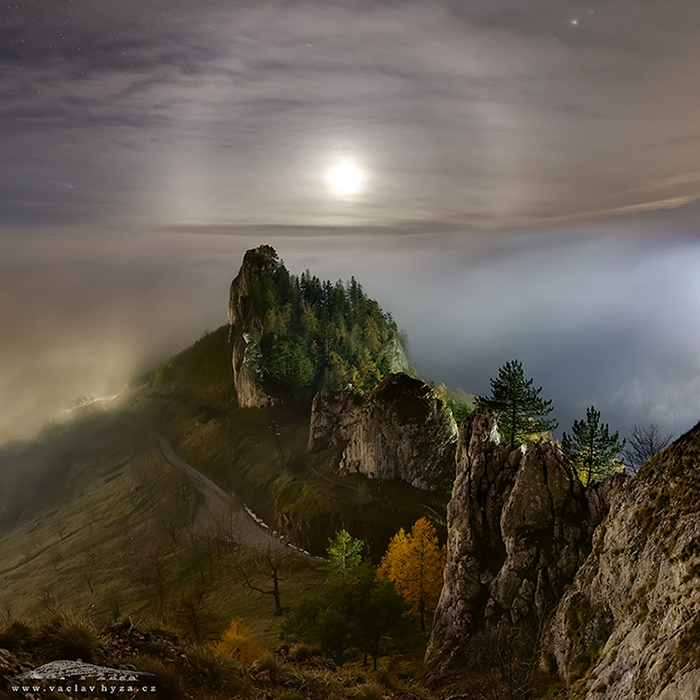Submissions: 2017 November
Re: Submissions: 2017 November
IC 405 (Flaming Star Nebula)
http://www.astrobogdan.pl/wp/wp-content ... koniec.jpg
TEC140 f/5,2 ATIK One 6.0, Paramount MyT
Exposure: (SII,Ha,OIII) 15,5h (21x900s bin, 22x900s, 19x900s) (binx1)
11.2017 Ochojno, Poland
Bogdan Jarzyna
http://www.astrobogdan.pl
http://www.astrobogdan.pl/wp/wp-content ... koniec.jpg
TEC140 f/5,2 ATIK One 6.0, Paramount MyT
Exposure: (SII,Ha,OIII) 15,5h (21x900s bin, 22x900s, 19x900s) (binx1)
11.2017 Ochojno, Poland
Bogdan Jarzyna
http://www.astrobogdan.pl
-
SpookyAstro
- Science Officer
- Posts: 117
- Joined: Sat Feb 07, 2015 7:38 pm
Re: Submissions: 2017 November
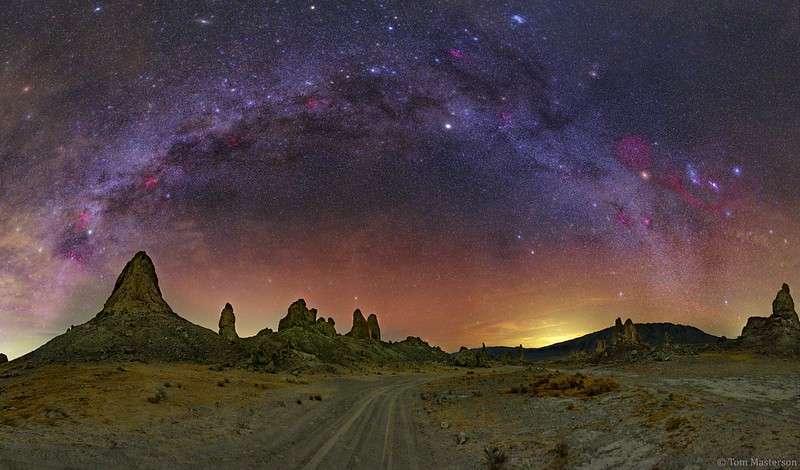
Fall Milky Way Above the Trona Pinnacles by Transient Astronomer, on Flickr
Image Credit and Copyright Tom Masterson
Last edited by SpookyAstro on Thu Nov 23, 2017 6:13 am, edited 1 time in total.
Re: Submissions: 2017 November
NGC1499, The California Nebula, in narrowband HST palette.
Optic: SV130 F4.5,Camera: STL11K,Mount: Mach1GTO
Ha: 9 x 20min
S2: 6 x 20min
O3: 6 x 20min
Larger size and info here:
http://www.pbase.com/dsnope/image/166494563/original
Optic: SV130 F4.5,Camera: STL11K,Mount: Mach1GTO
Ha: 9 x 20min
S2: 6 x 20min
O3: 6 x 20min
Larger size and info here:
http://www.pbase.com/dsnope/image/166494563/original
-
paddygilliland
- Ensign
- Posts: 23
- Joined: Fri Oct 20, 2017 8:58 am
- Adrien Mauduit
- Ensign
- Posts: 81
- Joined: Thu Dec 15, 2016 10:58 pm
- Location: Tromsø, Norway
- Contact:
Re: Submissions: 2017 November
Venus and Jupiter rising above El Teide
Credits: Adrien Mauduit
For my last morning on top of El Roque in La Palma, where I slept all night in my car to shoot astrophotography, I woke up to the most pure, eerie and out of this world sight. Not only Venus and Jupiter were rising so bright in the nautical dawn, but it was in the best Earthshine gradient I have witnessed to date, showcasing the purity of the air. It's almost like you're on a plane watching the sunrise! Above all that, I wasn't sure about it at first, but what else that big could rise above the clouds east of La Palma? Canary islands' most iconic and highest mountain, El Teide, which is also a volcano. I remember shooting astrophotography there two years ago, so it brought back good memories, and now I saw it from a total different angle!
Sony a7rII + Tamron 70-300mm, f/5.6, 300mm, ISO 800, 1/320''
Single image
More at www.adphotography-online.com
Fb: https://www.facebook.com/AdrienMauduitPhotography/
Credits: Adrien Mauduit
For my last morning on top of El Roque in La Palma, where I slept all night in my car to shoot astrophotography, I woke up to the most pure, eerie and out of this world sight. Not only Venus and Jupiter were rising so bright in the nautical dawn, but it was in the best Earthshine gradient I have witnessed to date, showcasing the purity of the air. It's almost like you're on a plane watching the sunrise! Above all that, I wasn't sure about it at first, but what else that big could rise above the clouds east of La Palma? Canary islands' most iconic and highest mountain, El Teide, which is also a volcano. I remember shooting astrophotography there two years ago, so it brought back good memories, and now I saw it from a total different angle!
Sony a7rII + Tamron 70-300mm, f/5.6, 300mm, ISO 800, 1/320''
Single image
More at www.adphotography-online.com
Fb: https://www.facebook.com/AdrienMauduitPhotography/
Adrien Louis Mauduit
M. Sc. in environmental sciences
Astrophotographer - cinematographer -
Aurora expert - Science communication & author
www.nightlightsfilms.com
nightlightsfilms@gmail.com
M. Sc. in environmental sciences
Astrophotographer - cinematographer -
Aurora expert - Science communication & author
www.nightlightsfilms.com
nightlightsfilms@gmail.com
-
barretosmed
- Science Officer
- Posts: 482
- Joined: Thu Oct 12, 2017 6:04 pm
Re: Submissions: 2017 November
M31

M31 Andromeda Galaxy by Brendan Kinch, on Flickr
Higher resolution & full info: http://www.kinchastro.com/m31-andromeda-galaxy.html

M31 Andromeda Galaxy by Brendan Kinch, on Flickr
Higher resolution & full info: http://www.kinchastro.com/m31-andromeda-galaxy.html
Re: Submissions: 2017 November
NGC281 Pacman nebula
Copylight ByoungJun Jeong
full resolution
https://www.astrobin.com/full/313769/0/
Copylight ByoungJun Jeong
full resolution
https://www.astrobin.com/full/313769/0/
Re: Submissions: 2017 November
I really, really, really like this image!Kinch wrote:M31
M31 Andromeda Galaxy by Brendan Kinch, on Flickr
Higher resolution & full info: http://www.kinchastro.com/m31-andromeda-galaxy.html
What I particularly like is the subtle colors and the relative faintness of the galaxies. Look at that large, faint disk of M31, which, anchored by long dust lanes, blends into the gradually brighter bulge, in the middle of which the tiny, bright nucleus peeks out! It looks so, so right!
I do wonder about a few things, for example the fact that the surface brightness of the inner bulge of M31 appears to be lower than the surface brightness of M32. And while I love the blue color of the center of NGC 205, it looks perhaps just a shade too saturated.
But you have explained the reasons for your problems on your own home page:
Wow! Given problems like that, the final image is not only good looking, it is absolutely superb!Kinchastro wrote:
I went to a dark site to take the subs for this image. My first time imaging away from home. I had all the gear prepared and battery charged but disaster struck just about midnight. A fuse blew on the DC splitter and I lost all power to mount, camera etc. You will note from the information below that I actually only got 1 minute of luminance data and the RGB is very unevenly acquired.
Ann
Color Commentator
-
MindaugasMacijauskas
Re: Submissions: 2017 November
This photograph are not photograph at all…
It is nearly 2 million stars from the Tycho 2 catalog, plotted in the galactic coordinate system. Each stars size and color was plotted according to its visual magnitude and color index - difference between magnitudes in "B" (blue) and in "V" (red) color filters. So, this image should (approximately) correspond to what we see with our eyes. If we had an eyes of the giants, because we can see only about 5000 stars, instead of ... 1,800,000.
This is my little spare time project. Final goal – to create fully digital „picture“ of our Galaxy. Made from data, not images. Current improvements since I‘ve started this:
- bright stars (not available on Tycho catalog) added from Yale Bright Stars Catalog (BSC).
- H alpha emission data (simply - nebulae) added from WHAM and SHASSA sky surveys.
Credit: ESA/The WHAM Sky Survey/Mindaugas Macijauskas

Map of the Milky Way galaxy by Mindaugas Macijauskas, on Flickr
It is nearly 2 million stars from the Tycho 2 catalog, plotted in the galactic coordinate system. Each stars size and color was plotted according to its visual magnitude and color index - difference between magnitudes in "B" (blue) and in "V" (red) color filters. So, this image should (approximately) correspond to what we see with our eyes. If we had an eyes of the giants, because we can see only about 5000 stars, instead of ... 1,800,000.
This is my little spare time project. Final goal – to create fully digital „picture“ of our Galaxy. Made from data, not images. Current improvements since I‘ve started this:
- bright stars (not available on Tycho catalog) added from Yale Bright Stars Catalog (BSC).
- H alpha emission data (simply - nebulae) added from WHAM and SHASSA sky surveys.
Credit: ESA/The WHAM Sky Survey/Mindaugas Macijauskas

Map of the Milky Way galaxy by Mindaugas Macijauskas, on Flickr
- Adrien Mauduit
- Ensign
- Posts: 81
- Joined: Thu Dec 15, 2016 10:58 pm
- Location: Tromsø, Norway
- Contact:
Re: Submissions: 2017 November
Northern Taurids, Pleiades and California nebula
Adrien Mauduit
On the night of November 22nd 2017, I decided to take a time-lapse of the pleiades and the california nebula to show the color difference of the two completely different objects, the one star cluster reflecting its light onto a passing gas cloud, and the other one a faint emission nebula, well visible with a modified camera. As I scrolled through my shots, two northern Taurid meteors photobombed the frame taken at 135mm. I stacked 50 frames plus the two containing the two meteors into one to reduce noise and increased contrasts. It was very challenging for me because I was not in the comfort of my home, but on vacation on La Palma in the Canary Islands, and on top of the volcano, the wind picked up to 20 m/s! I had to reduce my exposure time to 15 seconds, as the pictures were tracked with the Vixen Polarie. I also used a light pollution filter (Pure night by Lonely Speck), but the gear used remained very simple. I love that we are able to achieve wonders like this with such little equipment these days!
Canon 6D Baader modded, Samyang 135mm f/2, 50 x 15'' @ ISO 6400, f/2.8, no calibration frames, Light pollution filter Pure Night 85mm, tracked with Vixen Polarie, stacked with Nebulosity 4, post-process in Lr/Ps
Adrien Mauduit
On the night of November 22nd 2017, I decided to take a time-lapse of the pleiades and the california nebula to show the color difference of the two completely different objects, the one star cluster reflecting its light onto a passing gas cloud, and the other one a faint emission nebula, well visible with a modified camera. As I scrolled through my shots, two northern Taurid meteors photobombed the frame taken at 135mm. I stacked 50 frames plus the two containing the two meteors into one to reduce noise and increased contrasts. It was very challenging for me because I was not in the comfort of my home, but on vacation on La Palma in the Canary Islands, and on top of the volcano, the wind picked up to 20 m/s! I had to reduce my exposure time to 15 seconds, as the pictures were tracked with the Vixen Polarie. I also used a light pollution filter (Pure night by Lonely Speck), but the gear used remained very simple. I love that we are able to achieve wonders like this with such little equipment these days!
Canon 6D Baader modded, Samyang 135mm f/2, 50 x 15'' @ ISO 6400, f/2.8, no calibration frames, Light pollution filter Pure Night 85mm, tracked with Vixen Polarie, stacked with Nebulosity 4, post-process in Lr/Ps
Adrien Louis Mauduit
M. Sc. in environmental sciences
Astrophotographer - cinematographer -
Aurora expert - Science communication & author
www.nightlightsfilms.com
nightlightsfilms@gmail.com
M. Sc. in environmental sciences
Astrophotographer - cinematographer -
Aurora expert - Science communication & author
www.nightlightsfilms.com
nightlightsfilms@gmail.com
Re: Submissions: 2017 November
Via Lactea y Luz Zodiacal
Obsevatorio Atronomico Cesco - Parque Nacional El Leoncito - San Juan - Argentina
16.11.2017 © Carlos Di Nallo - 2017
https://carlosdn-alfacentauri.blogspot. ... iacal.html
Obsevatorio Atronomico Cesco - Parque Nacional El Leoncito - San Juan - Argentina
16.11.2017 © Carlos Di Nallo - 2017
https://carlosdn-alfacentauri.blogspot. ... iacal.html
Re: Submissions: 2017 November
Thank you Ann, nice of you to say so. I learned a few things processing that one.......and also learned a few things about imaging two hours drive away from homeAnn wrote:Kinch wrote:M31
Wow! Given problems like that, the final image is not only good looking, it is absolutely superb!
Ann
-
rwittich_de
- Ensign
- Posts: 78
- Joined: Thu Feb 03, 2011 12:53 pm
- Contact:
Re: Submissions: 2017 November
Re: Submissions: 2017 November
-
barretosmed
- Science Officer
- Posts: 482
- Joined: Thu Oct 12, 2017 6:04 pm
Re: Submissions: 2017 November
https://www.astrobin.com/full/322693/0/?nc=user
WANING CRESCENT MOON 11% LIGHTING, WITH FOCUS ON ARE NOT LIGHTED.
DATE: 11/15/2017
SCHEDULE OF BRASILIA: 05:15
EQUIPMENT: ESPRIT 150 ED
ASI 1600MM COLED
WANING CRESCENT MOON 11% LIGHTING, WITH FOCUS ON ARE NOT LIGHTED.
DATE: 11/15/2017
SCHEDULE OF BRASILIA: 05:15
EQUIPMENT: ESPRIT 150 ED
ASI 1600MM COLED
-
Václav Hýža
- Ensign
- Posts: 27
- Joined: Thu Jun 22, 2017 3:18 pm
- Location: Czech Republic
- Contact:
Re: Submissions: 2017 November
location: Biele Karpaty in Slovakia.
in the picture is: In the photo are the Vrsatske bradla with the ruins of the castle Vrsatec. A beautiful halo was created around the Moon.
date: 24.11.2017
Processing Information: Panorama from 22 shots.
Original dimensions: 6619 x 6619 pixels
in the picture is: In the photo are the Vrsatske bradla with the ruins of the castle Vrsatec. A beautiful halo was created around the Moon.
date: 24.11.2017
Processing Information: Panorama from 22 shots.
Original dimensions: 6619 x 6619 pixels
Re: Submissions: 2017 November
South Pole Celeste, above the image the two Magallanic Cluods
Master remote telescope of Moscow State University, installed in the Observatory CESCO.
© Carlos Di Nallo
http://carlosdn-alfacentauri.blogspot.com.ar/
Master remote telescope of Moscow State University, installed in the Observatory CESCO.
© Carlos Di Nallo
http://carlosdn-alfacentauri.blogspot.com.ar/
-
orangemaze
- Asternaut
- Posts: 2
- Joined: Sun Nov 26, 2017 12:18 pm
Re: Submissions: 2017 November
M33 Triangulum Galaxy
https://peternagy.smugmug.com/Telescope ... -CsFnV6r/A
Location: Reno, Nevada
Date: 11/17/2017
0.93"/pixel image scale.
Astrodon Red filter, 12 x 5 minutes, 1x1. 11/17/2017.
Astrodon Green filter, 12 x 5 minutes, 1x1. 11/17/2017.
Astrodon Blue filter, 12 x 5 minutes, 1x1. 11/17/2017.
Astrodon Lum filter, 36 x 5 minutes, 1x1. 11/17/2017.
TEC 140 APO F/7 with TEC Field Flattener, Astro-Physics A-P1100GTO GEM. QSI660wsg. OAG and Ultrastar autoguider, Optec Handy Stepper Motor focuser.
Captured and automated with SGP. Calibration (including Dark Subtraction) and Post-processed with PixInsight. PHD2 settings: RA Aggressiveness: 60, RA Hysteresis: 10, Max RA/Dec Duration: 2000, Min Move: 0.45, Calibration Steps: 250msec, Auto/Resist Switching, 1 sec guiding exposure.

https://peternagy.smugmug.com/Telescope ... -CsFnV6r/A
Location: Reno, Nevada
Date: 11/17/2017
0.93"/pixel image scale.
Astrodon Red filter, 12 x 5 minutes, 1x1. 11/17/2017.
Astrodon Green filter, 12 x 5 minutes, 1x1. 11/17/2017.
Astrodon Blue filter, 12 x 5 minutes, 1x1. 11/17/2017.
Astrodon Lum filter, 36 x 5 minutes, 1x1. 11/17/2017.
TEC 140 APO F/7 with TEC Field Flattener, Astro-Physics A-P1100GTO GEM. QSI660wsg. OAG and Ultrastar autoguider, Optec Handy Stepper Motor focuser.
Captured and automated with SGP. Calibration (including Dark Subtraction) and Post-processed with PixInsight. PHD2 settings: RA Aggressiveness: 60, RA Hysteresis: 10, Max RA/Dec Duration: 2000, Min Move: 0.45, Calibration Steps: 250msec, Auto/Resist Switching, 1 sec guiding exposure.

Last edited by topboxman on Sun Nov 26, 2017 9:26 pm, edited 1 time in total.
-
jaspalchadha
- Ensign
- Posts: 52
- Joined: Tue Jun 09, 2015 10:23 am
- Location: England
- Contact:
